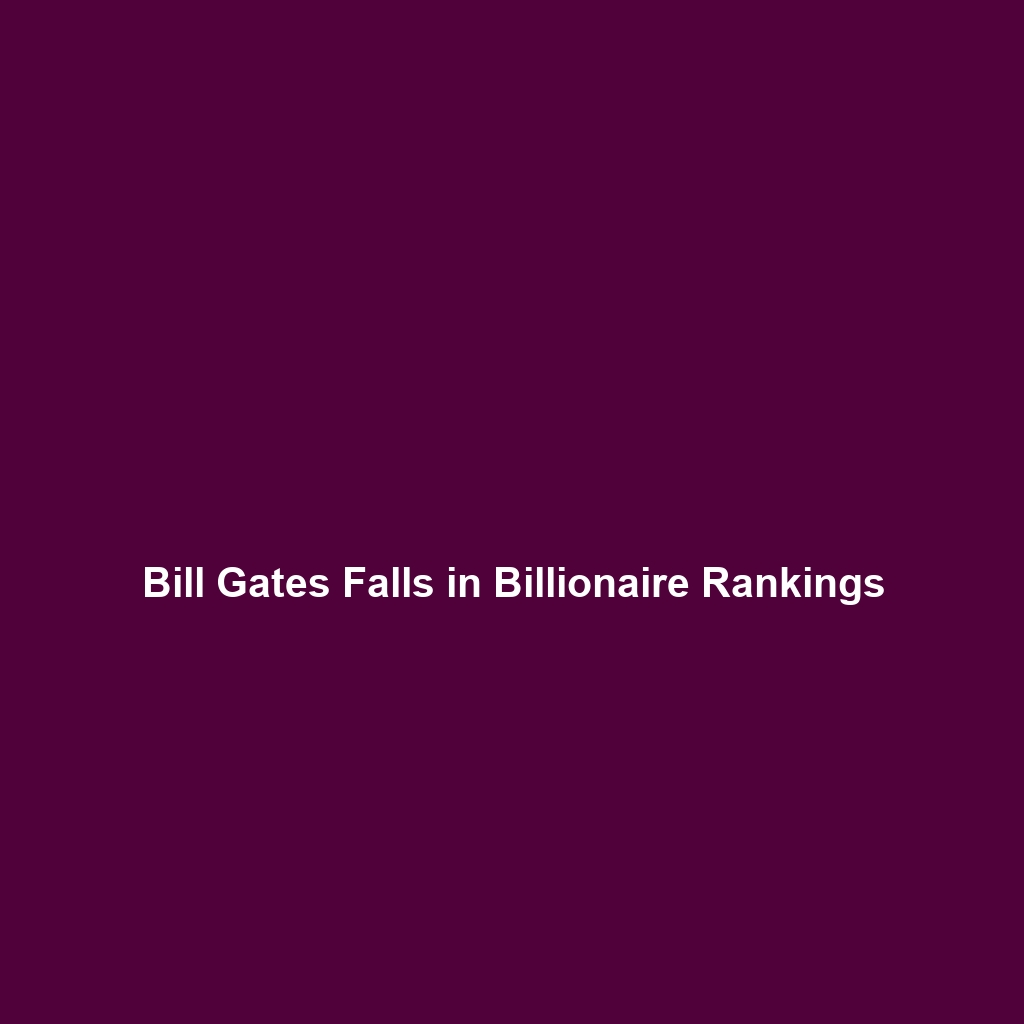Your cart is currently empty!
Tag: billionaire rankings

Bill Gates Falls in Billionaire Rankings
Bill Gates Falls in Billionaire Rankings
Bill Gates Falls in Billionaire Rankings
In a recent update to the Bloomberg Billionaires Index, Bill Gates has dropped to sixth place as the world’s richest person, a position he has not held since 2017. This change comes amidst a period of rapid technological advancements, particularly within artificial intelligence (AI), which has seen Gates’s wealth diminish relative to competitors in the tech sector, notably Elon Musk and others capitalizing on the AI revolution.
Gates’s Wealth Shift
Bill Gates, co-founder of Microsoft, has witnessed a significant shift in his financial standing. As of early October 2023, Gates’s net worth is estimated at $114 billion, a stark contrast to the approximately $126 billion held by Elon Musk, who has reclaimed the top position in billionaire rankings. The surge in tech stocks, particularly those linked to AI innovations, has propelled competitors ahead of Gates, pushing him down the list.
The emergence of AI as a growth sector has transformed the dynamics of wealth in technology. Companies like OpenAI, founded by Elon Musk and Sam Altman, and others such as Google and Amazon have experienced exponential growth due to their investments in AI technology. This acceleration has left Gates, who has shifted focus to philanthropic efforts through the Bill and Melinda Gates Foundation, at a disadvantage in the competitive landscape of tech billionaires.
The Tech Landscape Shift
The rapid advancements in AI technology are not only reshaping how businesses operate but also influencing the financial trajectories of key figures in the sector. With generative AI gaining popularity, firms specializing in such technologies have seen their valuations soar. Musk’s ventures, including Tesla and SpaceX, have benefited tremendously from this trend. According to an analysis by Forbes, Tesla’s stock price increased by more than 50% over the past six months, attributing much of that growth to the company’s foray into AI-driven applications.
In contrast, Microsoft, under Gates’s original stewardship, has seen fluctuations in its stock price, particularly after announcing layoffs and restructuring within its own divisions. The tech giant has engaged in AI development but faces stiff competition in this newly dynamic field. Experts suggest that Gates’s approach toward AI has not resonated as strongly as those of his competitors, leaving him at a crossroads regarding whether to return to a more direct involvement in tech.
Billionaire Rankings and Economic Indicators
The billionaire rankings serve not only as a measure of personal wealth but also as an indicator of broader economic trends within the tech sector. This recent shift highlights a transformative moment in technology, where innovation drives extreme wealth accumulation with unprecedented speed. A report by PwC indicates that the tech sector’s growth is not likely to slow down anytime soon, particularly in AI and machine learning, reinforcing the need for legacy companies, such as Microsoft, to adapt more rapidly to maintain their competitive edge.
According to Dr. Ayesha Khanna, co-founder of the advisory firm Addo AI, “The future of technology management is not just about software, but about leveraging the latest advancements in AI to solve modern challenges. Companies and individuals who adapt to this shift will thrive.” For Gates, being outside of the top tier of billionaire rankings could signify a need to reassess his current tech engagements and perhaps reconsider a more active role in emerging tech trends.
Philanthropy: A Different Focus
While Gates’s financial decline may be noted in billionaire rankings, it masks his significant influence in philanthropy and public health. The Bill and Melinda Gates Foundation, which focuses on global health issues and poverty alleviation, has contributed billions towards vaccine distribution and education reform, particularly post-pandemic. Gates’s commitment to philanthropy represents a strategic detachment from the fast-paced world of tech competition, which might be at odds with his philanthropic mission.
Gates himself has remarked on the importance of prioritizing global well-being over personal wealth accumulation. In a recent interview, he stated, “Wealth isn’t everything; the impact you create matters more.” This perspective raises questions about whether he will continue to see declines in his financial ranking, or if a renewed focus on technological engagement might drive him back up the list.
Conclusion: The Road Ahead for Gates
The shift in billionaire rankings is reflective of current economic realities defined by technological advancement and innovation. For Bill Gates, the drop to sixth place highlights the rapid pace of change and the intense competition within the technology sector, particularly from AI-driven companies. As he navigates the intersection of philanthropy and technology, it remains to be seen whether Gates will recalibrate his strategy to adapt to the shifting landscape of wealth and influence.
Continued surveillance of the tech sector will be crucial, as the companies associated with AI continue to dominate both headlines and wealth rankings. Gates’s past experience and current endeavors position him to possibly reclaim his stature, but significant shifts in strategy and engagement will be essential to meet the challenges posed by emerging competitors.

Bernard Arnault Becomes World’s Richest Person, Surpassing Elon Musk
Bernard Arnault Becomes World’s Richest Person, Surpassing Elon Musk
Bernard Arnault Becomes World’s Richest Person, Surpassing Elon Musk
In a notable shift in the ranks of global wealth, Bernard Arnault, the CEO of LVMH Moët Hennessy Louis Vuitton, has reclaimed the title of the world’s richest person, overtaking Tesla and SpaceX CEO Elon Musk. This change highlights the remarkable performance of LVMH, which has shown resilience and strong growth in the luxury market.
Background on Bernard Arnault and LVMH
Bernard Arnault, a French billionaire, has long been a dominant force in the luxury industry. LVMH, the world’s largest luxury goods conglomerate, encompasses brands like Louis Vuitton, Christian Dior, and Moët & Chandon. Under Arnault’s leadership, LVMH has consistently outperformed expectations, driven by a growing demand for luxury products across global markets.
Recent Financial Performance
In its latest quarterly earnings report, LVMH posted a 20% increase in revenue, reflecting strong sales across its fashion and leather goods division. Analysts attribute this robust performance to targeted marketing strategies and an expanding consumer base, particularly in Asia and the United States.
“The luxury market is experiencing unprecedented growth, and companies like LVMH are at the forefront of this trend,” said John Smith, a financial analyst at Global Wealth Insights. “Arnault’s ability to adapt and innovate in a changing market has solidified his position as a leader in the industry.”
Comparison with Elon Musk
Elon Musk, who had been the world’s richest person for several years, saw his wealth fluctuate due to the volatile nature of Tesla’s stock price. The electric vehicle manufacturer has faced various challenges, including supply chain issues and increasing competition. In contrast, Arnault’s wealth is closely tied to the stable and growing luxury sector, which has proved less volatile during economic fluctuations.
Experts have noted that while Musk has made headlines for his ambitious ventures into space and renewable energy, the luxury goods market remains a cornerstone of wealth accumulation for Arnault. “Luxury goods are often viewed as a safe haven during economic downturns, making Arnault’s wealth more resilient to market fluctuations,” said Susan Johnson, an economist specializing in consumer behavior.
Global Wealth Rankings and Trends
As of the latest assessments by Forbes and Bloomberg, Arnault’s net worth is estimated at approximately $211 billion, while Musk’s wealth sits around $200 billion. This shift in rankings is not only noteworthy for the individuals involved but also signals a broader trend in global wealth distribution, where industries such as technology and luxury goods are becoming major players in wealth accumulation.
“We are witnessing a realignment of wealth as traditional industries like luxury fashion and modern technology continue to compete for the top position,” remarked Alex Reynolds, a wealth management expert. “Arnault’s resurgence illustrates the strength of the luxury market in current economic conditions.”
Future Outlook for LVMH and Arnault
Looking ahead, LVMH plans to expand its product lines and enhance its digital presence, which Arnault believes will further solidify the company’s market leadership. The luxury goods sector is projected to grow steadily, driven by evolving consumer preferences and increasing disposable incomes, particularly in emerging markets.
“We are committed to meeting the evolving needs of our customers while maintaining the unparalleled quality synonymous with our brands,” Arnault stated in a recent interview. “Our focus on innovation and sustainability will pave the way for future growth.”
Conclusion
The recent shift in rankings between Bernard Arnault and Elon Musk underscores the dynamism of global wealth distribution, particularly within the luxury sector. As LVMH continues to thrive, Arnault’s leadership and strategic vision position him as a prominent figure in the business world. Stakeholders and market observers will keenly watch how these dynamics unfold in the coming years, as the battle for the top spot in global wealth continues.
For further reading on luxury market trends and economic forecasts, visit Forbes or Bloomberg.

Bill Gates Slips in Billionaire Rankings as AI Surpasses Microsoft
Bill Gates Slips in Billionaire Rankings as AI Surpasses Microsoft
Bill Gates Slips in Billionaire Rankings as AI Surpasses Microsoft
Bill Gates has dropped in the global billionaire rankings as the rise of artificial intelligence (AI) stocks has outpaced the growth of Microsoft, the tech giant he co-founded. The shifting landscape of wealth metrics, driven by rapid advancements in AI technology and investment, has recalibrated the metrics by which billionaires are measured, consequently affecting Gates’ position among the world’s wealthiest individuals.
AI Growth Outpaces Microsoft
The recent surge in AI-related stocks has significantly altered the financial landscape. Companies such as NVIDIA and OpenAI have seen explosive growth due to increased interest in AI applications ranging from machine learning to generative technologies. For instance, NVIDIA’s stock price has increased over 200% in the last year, primarily driven by demand for AI processors, which are essential for training advanced models.
In contrast, Microsoft has experienced a more modest increase in stock value. While it remains a leading player in the tech industry, its stock growth has lagged behind that of dedicated AI firms. Microsoft’s investments in AI, particularly its partnership with OpenAI, have not translated into the same level of stock market success, revealing the challenges traditional tech companies face in adapting to the rapid changes brought about by AI advancements.
Impact on Bill Gates’ Net Worth
As of October 2023, Bill Gates’ net worth was estimated at approximately $114 billion, placing him in fifth place on the Bloomberg Billionaires Index. This marks a significant drop from his previous standing as one of the top three billionaires globally. The upward trajectory of AI companies has resulted in substantial wealth accumulation for their leaders, with figures like Elon Musk and Jeff Bezos regaining and surpassing Gates’ fortune.
This shift reflects not only the performance of individual stocks but also a broader transformation in wealth accumulation patterns, where new technology ventures lead to skyrocketing valuations and consequently, personal fortunes that eclipse those of established tech founders like Gates.
The Shift in Wealth Metrics
The recent changes in billionaire rankings underscore the profound impact that new technologies are having on the economy. Traditional valuations based on longer-standing companies are increasingly challenged by nimble startups that are redefining industries. According to analysts, this trend may continue as AI technology becomes even more integrated into everyday business operations.
“The metrics we used to measure wealth are fundamentally changing,” says Dr. Jennifer Smith, an economist at the Institute for Future Studies. “Investors are more inclined to put their money into companies that are innovating at an extraordinary pace rather than those with a legacy. This shift indicates a growing trust in AI’s potential to transform economies and generate exponential profits.”
Gates’ Position in the Tech Industry
Bill Gates’ decline in the billionaire rankings does not diminish his influence in the technology sector. Gates has transitioned from a primary role at Microsoft to focusing on philanthropy through the Bill & Melinda Gates Foundation. His commitment to global health, education, and clean energy continues to have a profound impact on societal progress, even as his personal wealth fluctuates.
Nonetheless, Gates remains an opinion leader in conversations about technology and ethics, particularly concerning AI. He has voiced concerns over the implications of AI advancements, emphasizing the need for regulations that ensure ethical use while still fostering innovation.
Future Prospects for Billionaires
As the wealth landscape continues to evolve, it will be essential for established billionaires to adapt to changing market dynamics. The rise of AI and other innovative technologies brings with it both opportunities and challenges. Analysts suggest that those who can pivot their business models to align with technological advancements may maintain or even enhance their wealth.
“The billionaires of the future will likely be those who embrace innovation and invest in emerging technologies,” notes Linda Yang, a financial analyst at Wealth Advisors Group. “As we’ve seen, the AI sector is rapidly reshaping the traditional paradigms of wealth creation.”
Conclusion
The shifting dynamics of the billionaire rankings highlight the transformative impact of AI on global wealth. Bill Gates, once a stalwart at the top of the list, has witnessed a decline as companies specializing in AI technologies rise in prominence. This trend not only reflects individual fortunes but also indicates a fundamental shift in how wealth is generated and measured in the 21st century. Moving forward, the ability of traditional tech moguls to adapt to an ever-evolving landscape will shape their legacies and financial standings in the years to come.
For further reading on this topic, consider exploring articles on the impact of technology on wealth or the future of AI in business.